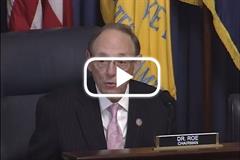Press Releases
Chairman Roe Opening Statement: The VA Accountability and Whistleblower Protection Act: One Year Later
Washington,
July 17, 2018
|
Tiffany Haverly
(202-225-3527)
Washington, D.C. - Today, the House Committee on Veterans’ Affairs, chaired by Rep. Phil Roe, M.D. (R-Tenn.), held an oversight hearing on the implementation of The Department of Veterans Affairs Accountability and Whistleblower Protection Act of 2017.
Below are Chairman Roe’s opening remarks from the hearing:
Good morning. The Committee will come to order. Welcome and thank you all for joining us for today’s Full Committee hearing examining the implementation of the Department of Veterans Affairs Accountability and Whistleblower Protection Act of 2017. Last year’s enactment of this bipartisan legislation was the culmination of years of work by members of this Committee, and I believe it is one of the most consequential reforms to the Federal civil service system in decades. This law was put in place to provide the Secretary the tools he or she needs to protect whistleblowers and hold poor preforming or misbehaving employees accountable. I’ve said time and time again that the vast majority of VA employees are good, hard-working men and women who take VA’s core mission to heart, but before this law the bad actions of a few tainted the good names of many for far too long. The drafting of this legislation didn’t happen in a vacuum. Ideas to improve the legislation were received from all corners, to include Federal employee unions. It was not an ideological or partisan attack on Federal workers. In fact, the final negotiated package passed the U.S. Senate by voice vote, the full House by a vote of 368 to 55, including 23 of the 24 members of this Committee and 137 democrats, and was supported by 18 veteran service organizations. While I am proud that we were able to come together and craft this important legislation, our role in overseeing the law’s implementation is equally as important. That is why we are here today. The only way to bring true accountability to VA is to create a culture where employees want to come to work and serve veterans. This will only happen when good work is consistently rewarded and when it’s clear the department won’t tolerate employees who do not live up to the high standards required of public servants. We all remember the stories of poor performance and misconduct this Committee and others uncovered about a select few VA employees who had refused to, or were incapable of, adhering to these high standards. We found time and time again that civil service laws made it extremely difficult and time consuming to hold an employee accountable who didn’t share VA’s values, even in instances where the employee in question had broken the law. I think every one of us on this dais can agree that is unacceptable and that our veterans deserve better. So today, we are here to discuss how VA is moving toward this goal of sustainable accountability and efforts to educate employees and managers about this new authority. I also want to make it clear that while this law made it easier to discipline poor employees, it did not give VA the license to use this authority to target employees, no matter their position or grade, or to retaliate against whistleblowers. The Department and this Committee continue to rely on whistleblowers to come forward and shed the light on waste, fraud and abuse throughout VA, and I hope to learn more about how implementation of this law is, or is not, protecting these courageous employees. We can’t measure success of this law’s implementation against a number of disciplinary actions, but we can measure failure. And if one single man or woman is afraid to come forward to report wrong-doing because of fear of retaliation, to me, that would be a failure. Before I recognize Ranking Member Walz, I do want to briefly touch on the operations of the Office of Accountability and Whistleblower Protection or OAWP. When we were negotiating the law that created this office, there were concerns expressed about creating yet another office at the VA that could duplicate efforts of other offices when what we really needed to do was empower managers to make the right decisions and hold them accountable when they fail to do so. While the employees and management of OAWP should be lauded for their efforts to improve accountability within VA, I am concerned that OAWP seeks to expand its role beyond what Congress intended. Particularly, I am concerned by some of the recommendations that the VA submitted to Congress as part of its June 30th annual report and about the growth of this new office and I look forward to addressing those concerns today. The goal of this new authority was to provide the Secretary a tool in their toolbox to discipline poor employees and I am worried that if we are not careful, OAWP may turn into an entirely new toolbox. We must ensure this does not happen. Also, while I am certainly no fan of red-tape or bureaucracy, I am concerned about the apparent lack of formal written policies or procedures for operations at OAWP. Formal policies and procedures would promote consistent OAWP decisions and inspire confidence in their worth and work product. I also remain concerned by the ongoing conflict between Mr. O’Rourke and the Inspector General over the IG’s access to OAWP’s database of complaints. Mr. O’Rourke, I hope that you and Mr. Missal have found a way to put this unnecessary distraction behind us. Finally, I want to reiterate this Committee will not shy away from our oversight role to investigate improper usage and implementation of this law. However, the only way to do so is to continue this Committee’s bipartisan tradition, examine issues with statistics and facts, and not with innuendo, anecdotal accounts or partisan agendas. |


